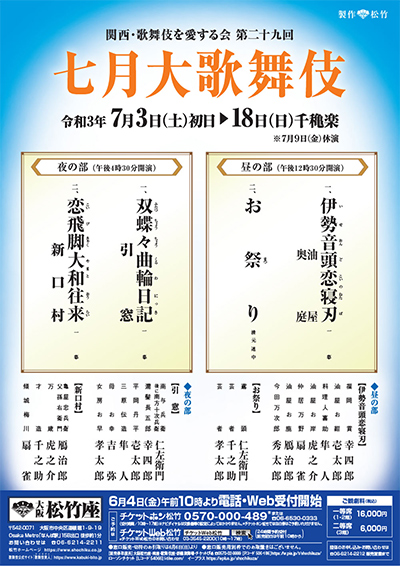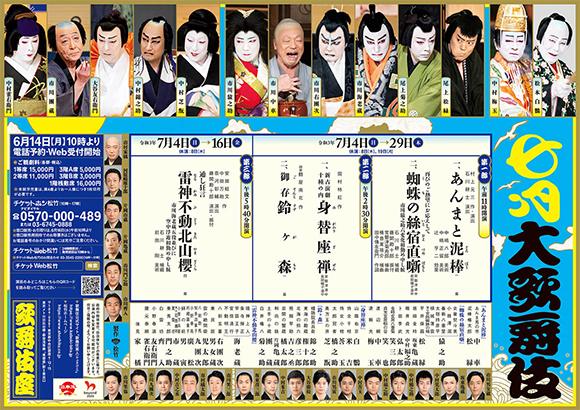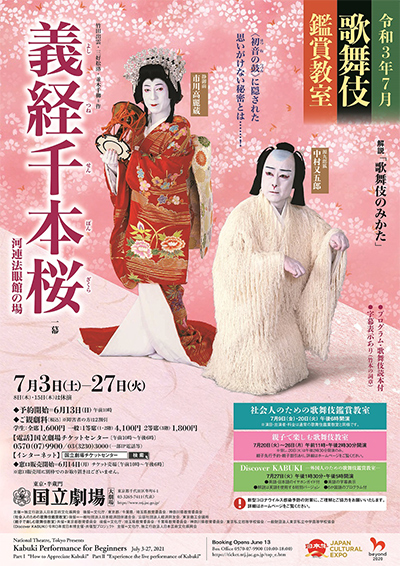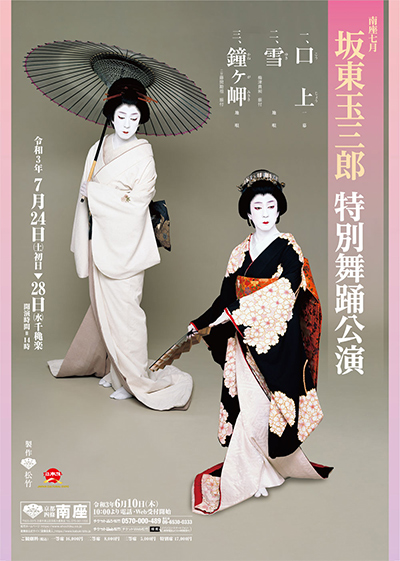| Dates |
3 ~ 18 July 2021
Kansai Kabuki o Ai Suru Kai Shichigatsu ďkabuki
The 29th Kansai Kabuki Lovers Society July Grand Kabuki |
| MatinÚe |
Ise Ondo Koi no Netaba
(Aburaya/Okuniwa)
Omatsuri
|
| Evening |
Futatsu Ch˘ch˘ Kuruwa Nikki (Hikimado)
Koi Bikyaku Yamato ďrai (Ninokuchi-mura)
|
| Casting |
Living National Treasure Kataoka Nizaemon, Nakamura Ganjir˘, Matsumoto K˘shir˘, Nakamura Senjaku, Kataoka Takatar˘, Nakamura Kazutar˘, Kamimura Kichiya, Nakamura Hayato, Nakamura Toranosuke, Kataoka Sennosuke
|
| Comments |
29th edition of the Kansai Kabuki Lovers Society July Grand Kabuki in ďsaka.
Ise Ondo: this play is famous for its classical
depiction of a woman who must pretend to reject her lover for his sake and
for the beautiful and gruesome dance-like killing scene at the end,
done to the music of the Ise pleasure quarters. Fukuoka Mitsugi (Matsumoto K˘shir˘),
a young apprentice at the holy Shrine of Ise tries to help find the stolen
treasured sword of his clan out of duty to his former lord. Mitsugi has the sword
in his possession, but must now find the certificate of authentication and
in order to get it for him, Okon (Nakamura Kazutar˘), a courtesan who is in love with Mitsugi
must pretend to forsake Mitsugi. But he believes that she has truly betrayed
him and further angered by the humiliating accusations of Manno (Nakamura Senjaku), the head
maid of the Aburaya brothel, Mitsugi inadvertently draws the sword, said
to be cursed, and the rampage begins. Featuring also Nakamura Hayato and Nakamura Ganjir˘ in the role of the cook Kisuke and the ugly courtesan Oshika.
Omatsuri: Living National Treasure Kataoka Nizaemon as a gallant fireman boss at a festival telling a rueful
tale of failure in love and showing the vigorous work songs of firefighters.
This is a 3-generation performance for the Matsushimaya guild as Living National Treasure Kataoka Nizaemon shares the stage with his son Kataoka Takatar˘ and his grandson Kataoka Sennosuke,
who play the roles of geisha.
Hikimado: originally written for the puppet theater,
this play shows a tragedy of commoners caught between their duty and their
feelings toward their loved ones. A sum˘
wrestler named Nuregami Ch˘gor˘ (Matsumoto K˘shir˘)
has killed a man and takes refuge at the home of his mother.
Unfortunately, her son (Living National Treasure Kataoka Nizaemon) has been ordered to arrest him.
All of these complicated conflicts are symbolized by the lightness and
darkness created by the humble skylight (hikimado in Japanese)
as a rope is pulled to move a wooden shutter. Featuring also Kataoka Takatar˘ in the role of Ohaya.
Ninokuchi-mura: in the pleasure quarters, the most important possessions were money and reputation.
In danger of losing his lover, the courtesan Umegawa (Nakamura Senjaku), the money courier Kameya Chűbŕ (Nakamura Ganjir˘) breaks the seals on a
package of money entrusted to him after being taunted by a rival, even though the use of such money is punishable
by death. In this scene, on their way to love suicide, the couple go through the snow covered landscape on
their way to the man's home town where they will meet their end. Featuring also Nakamura Ganjir˘ in the role of Chűbŕ's father Magoemon.
Sources: Earphone Guide Website or Sh˘chiku Kabuki Official Website
|
| Dates |
4 ~ 29 July 2021
Shichigatsu Hanagata Kabuki
July Young Actors Kabuki |
| 1st program |
Anma to Dorob˘
Kumo no Ito Oyozume Banashi
|
| 2nd program |
Migawari Zazen
Gozonji Suzu-ga-Mori
|
| 3rd program |
Narukami Fud˘ Kitayama Zakura
|
| Casting |
Living National Treasure Nakamura Kichiemon, Matsumoto Haku˘, Nakamura Shikan, Nakamura Jakuemon, Ichikawa Ebiz˘, Onoe Kikunosuke, Nakamura Baigyoku, Ichikawa Ennosuke, Nakamura Kinnosuke, Onoe Sh˘roku, Ichikawa Chűsha,
Ichikawa Danz˘, Ichikawa Udanji, Band˘ Hikosabur˘, Nakamura Kotar˘, ďtani Tomoemon, Ichikawa Monnosuke, Ichimura Kakitsu, Kawarasaki Gonjűr˘, Kataoka Ichiz˘, Kataoka Kamez˘, Band˘ Kamez˘, Ichikawa Sai'nyű, Ichikawa Omez˘, Ichikawa Emisabur˘, Ichikawa Emiya, Nakamura Yonekichi, Nakamura Hashinosuke, ďtani Hiromatsu, Nakamura Kangyoku, Nakamura Fukunosuke, Ichikawa Otora, Nakamura Kichinoj˘, Ichimura Kitsutar˘
|
| Comments |
The usual July Grand Kabuki programs at the Kabukiza. The 1st and 2nd programs are staged from the 4th to the 29th of July 2021.
The 3rd program is staged from the 4th to the 16th of July 2021. No performance the 8th and the 19th of July 2021.
Anma to Dorob˘:
(The Blind Masseur and the Thief)
This modern play by Murakami Genz˘ shows a thief (Onoe Sh˘roku) who tries to rob a blind masseur (Ichikawa Chűsha) of his savings,
thinking that he would be an easy target. But the masseur is more than a match for him and before the thief
knows what has happened, the two are drinking together like old friends and the masseur begins to try to
persuade him to give up his life of crime.
Kumo no Ito: one of the oldest dances related to the legend of a giant ground spider that
attacked the medieval warrior, Minamoto no Yorimitsu. Yorimitsu
is visited by the spider with magical powers disguised first as a child, second as a medicine peddler,
third as a courtesanĺs girl attendant, then as a blind masseur and finally as a courtesan.
After revealing its true nature the spider spins trying to trap the warrior in its web.
Starring Ichikawa Ennosuke in several roles. Featuring also Nakamura Baigyoku, Onoe Sh˘roku and Ichikawa Chűsha.
Migawari Zazen: a dance play adopted from a classical ky˘gen farce.
A man (Matsumoto Haku˘) wants nothing more than to visit his lover Hanako,
but he has one important problem, his homely and overbearing wife (Nakamura Shikan).
He creates a scheme saying that he will be practicing Zen meditation all night
and has his servant (Nakamura Hashinosuke) take his place while he visits Hanako.
He returns, giddy from a night of pleasure and
tells his story to his servant in dance, unaware that his wife has discovered
his deception and has taken his servant's place.
Suzu-ga-Mori: The young samurai Shirai Gonpachi (Onoe Kikunosuke) is ambushed near the
execution grounds of Edo on a dark night, but he manages to escape after a
gruesome but humorous fight scene. He is watched by Banzuiin Ch˘bŕ (Nakamura Kinnosuke), an Edo boss,
who is impressed with his fighting skills and agrees to give him shelter in the
city. This meeting between the handsome young Gonpachi and the heroic Ch˘bŕ is
one of the most famous meetings in Kabuki.
Narukami Fud˘: in 1742, the actor Ichikawa Ebiz˘ II (1688~1758) made a big gamble.
His father Ichikawa Danjűr˘ I had created the bombastic aragoto style
with exaggerated movements and red make-up to indicate strength but his career was cut short when he was murdered
on stage. The big question was whether this vigorous style which was suited to the tastes of the brash new city of
Edo would be acceptable to the more refined tastes of ďsaka and Ky˘to. He put together "Narukami Fud˘ Kitayama Zakura",
a play showcasing the greatest hits of Ichikawa Danjűr˘ I and Ichikawa Ebiz˘ II,
including the plays "Narukami", "Kenuki" and "Fud˘."
"Narukami" is about a holy man who imprisons the rain god bringing a drought,
who is then conquered by a beautiful woman sent to seduce him. When he finds that he has been betrayed,
his anger transforms him into a thunder god. The play also includes a scene called "Kenuki" (The Whiskers Tweezers)
about a powerful man who acts as a detective finding out why a princess's hair mysteriously stands on end.
He finds the crucial clue when his fashionable whisker tweezers float in the air. Finally, Ichikawa Ebiz˘ II appeared as the Buddhist deity Fud˘ My˘˘,
the god to whom he attributed his success. Originally all of these scenes were separate plays or routines that
were inserted into other plays. The performance in ďsaka was the first time that all of these scenes were
combined with a story about conspirators trying to seize the imperial throne. Ichikawa Ebiz˘ II's gamble
paid off and he was not only a massive success in Kansai, he established his
family's name as the top acting family in all of Japan. Starring Ichikawa Ebiz˘ in 5 roles: Kumedera Danj˘, the wicked priest Narukami, Prince Hayagumo,
Abe Kiyoyuki and the Deity Fud˘ My˘˘. Featuring also Nakamura Jakuemon, Nakamura Kotar˘ (Princess Taema), Ichikawa Udanji and Kataoka Ichiz˘.
Sources: Sh˘chiku Kabuki Official Website
|





